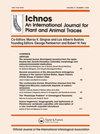Bivalve borings in Maastrichtian fossil Nypa fruits: Dakhla Formation, Bir Abu Minqar, South Western Desert, Egypt
IF 2
4区 地球科学
Q4 PALEONTOLOGY
Ichnos-An International Journal for Plant and Animal Traces
Pub Date : 2020-07-01
DOI:10.1080/10420940.2020.1784158
引用次数: 4
Abstract
Abstract Disconnected aggregates of allochthonous fossil Nypa fruits occur in the Ammonite Hill Member of the Dakhla Formation (Maastrichtian), exposed at the Bir Abu Minqar section, south Western Desert of Egypt. In a pale brown, calcareous siltstone and/or fine-grained sandstone layer, the fossil fruits found are densely infested by the borings Teredolites clavatus and Apectoichnus longissimus. In the specimens described, wood borings assigned to A. longissimus are more abundant than T. clavatus. Remains of the boring bivalves are not preserved. These aggregates of bored fruits likely accumulated in a warm, shallow, well-oxygenated marine environment. Prior to final accumulation, Nypa fruits drifted in seawater only for a short time and exhibit evidence of biostratinomic alterations. The present study is the first to systematically describe the occurrence of both nominal ichnotaxa from the Maastrichtian rocks in Egypt.马斯垂克特化石Nypa果实中的双壳类钻孔:Dakhla组,Bir Abu Minqar,西南沙漠,埃及
摘要:在埃及西南沙漠Bir Abu Minqar剖面,在Dakhla组(Maastrichtian)的amonite Hill段中发现了不完整的外来Nypa果实化石聚集体。在浅棕色的钙质粉砂岩和/或细粒砂岩层中,发现的化石果实密集地布满了钻孔Teredolites clavatus和Apectoichnus longissimus。在所描述的标本中,最长竹属的木孔比棍叶竹丰富。无聊的双壳类动物的残骸没有被保存下来。这些无聊果实的聚集体可能是在温暖、浅、含氧良好的海洋环境中积累起来的。在最终积累之前,Nypa果实在海水中只漂浮了很短的时间,并表现出生物层组学变化的证据。本研究首次系统地描述了埃及马斯特里赫特岩石中这两种名义石类群的出现。
本文章由计算机程序翻译,如有差异,请以英文原文为准。
求助全文
约1分钟内获得全文
求助全文
来源期刊
CiteScore
2.50
自引率
12.50%
发文量
0
审稿时长
>12 weeks
期刊介绍:
The foremost aim of Ichnos is to promote excellence in ichnologic research. Primary emphases center upon the ethologic and ecologic significance of tracemaking organisms; organism-substrate interrelationships; and the role of biogenic processes in environmental reconstruction, sediment dynamics, sequence or event stratigraphy, biogeochemistry, and sedimentary diagenesis. Each contribution rests upon a firm taxonomic foundation, although papers dealing solely with systematics and nomenclature may have less priority than those dealing with conceptual and interpretive aspects of ichnology. Contributions from biologists and geologists are equally welcome.
The format for Ichnos is designed to accommodate several types of manuscripts, including Research Articles (comprehensive articles dealing with original, fundamental research in ichnology), and Short Communications (short, succinct papers treating certain aspects of the history of ichnology, book reviews, news and notes, or invited comments dealing with current or contentious issues). The large page size and two-column format lend flexibility to the design of tables and illustrations. Thorough but timely reviews and rapid publication of manuscripts are integral parts of the process.

 求助内容:
求助内容: 应助结果提醒方式:
应助结果提醒方式:


